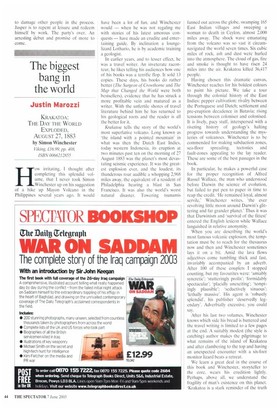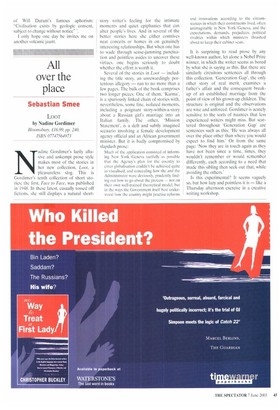The biggest bang in the world
Justin Marozzi
KRAKATOA: THE DAY THE WORLD EXPLODED, AUGUST 27, 1883 by Simon Winchester Viking, .06.99, pp. 408, ISBN 0066212855 How irritating, I thought after completing this splendid volume, that I never took Simon Winchester up on his suggestion of a hike up Mayon Volcano in the Philippines several years ago. It would
have been a lot of fun. and Winchester would — when he was not regaling rue with stories of his latest amorous conquests — have made an erudite and entertaining guide. By inclination a loungelizard Lothario, he is by academic training a geologist.
In earlier years, and to lesser effect, he was a travel writer. An inveterate raconteur, he likes telling his audiences how one of his books was a terrific flop. It sold 13 copies. These days, his books do rather better (The Surgeon of Crowthorne and The Map that Changed the World were both bestsellers), evidence that he has struck a more profitable vein and matured as a writer. With the unfertile shores of travel literature behind him he has returned to his geological roots and the reader is all the better for it.
Krakatoa tells the story of the world's most superlative volcano. Long known as the island with a pointed mountain' in what was then the Dutch East Indies, today western Indonesia, its eruption at two minutes past ten on the morning of 27 August 1883 was the planet's most devastating seismic experience. It was the greatest explosion ever, and the loudest, its thunderous roar audible a whopping 2,968 miles away, the equivalent of a resident of Philadelphia hearing a blast in San Francisco. It was also the world's worst natural disaster. Towering tsunamis fanned out across the globe, swamping 165 East Indian villages and sweeping a woman to death in Ceylon, almost 2,000 miles away. The shock wave emanating from the volcano was so vast it circumnavigated the world seven times. Six cubic miles of rock, ash and dust were hurled into the atmosphere. The cloud of gas, fire and smoke is thought to have risen 24 miles into the air. Krakatoa killed 36,417 people.
Having chosen this dramatic canvas, Winchester reaches for his boldest colours to paint his picture. We take a tour through the colonial history of the East Indies: pepper cultivation; rivalry between the Portuguese and Dutch; settlement and pre-eruption decadence in Batavia; rising tensions between coloniser and colonised. It is lively, pacy stuff, interspersed with a riveting history of geology's halting progress towards understanding the mysteries of volcanoes. Winchester is to be commended for making subduction zones, sea-floor spreading, tectonics and fault-zones appealing to the lay reader. These are some of the best passages in the book.
In particular, he makes a powerful case for the proper recognition of Alfred Russel Wallace, the man who understood before Darwin the science of evolution, but failed to put pen to paper in time to reap the credit. He remained loyal, almost servile,' Winchester writes, 'the ever revolving little moon around Darwin's glittering and far grander planet.' Thus it was that Darwinism and 'survival of the fittest' entered the English lexicon while Wallace languished in relative anonymity.
When you are describing the world's most famous volcanic explosion, the temptation must be to reach for the thesaurus now and then and Winchester sometimes lays it on a bit. Amid the lava flows adjectives come tumbling thick and fast, invariably accompanied by an adverb. After 100 of these couplets I stopped counting, but my favourites were: 'amiably syncretic'; 'stutteringly prolix'; 'formidably spectacular'; 'placidly unexciting'; 'temptingly plausible'; 'seductively sinuous'; 'lethally massive'. His agent is 'robustly splendid', his publisher 'deservedly legendary'. Adverbially excessive, you could say.
After his last two volumes, Winchester knows which side his bread is buttered and the travel writing is limited to a few pages at the end. A suitably modest (the style is catching) author makes the pilgrimage to what remains of the island of Krakatoa and after clambering to the top and having an unexpected encounter with a six-foot monitor lizard beats a retreat.
We learn a great deal in the course of this book and Winchester, storyteller to the core, wears his erudition lightly. Perhaps, above all, we understand the fragility of man's existence on this planet. 'Krakatoa is a stark reminder of the truth of Will Durant's famous aphorism: "Civilisation exists by geologic consent, subject to change without notice" '.
I only hope one day he invites me on another volcanic jaunt.











































































 Previous page
Previous page